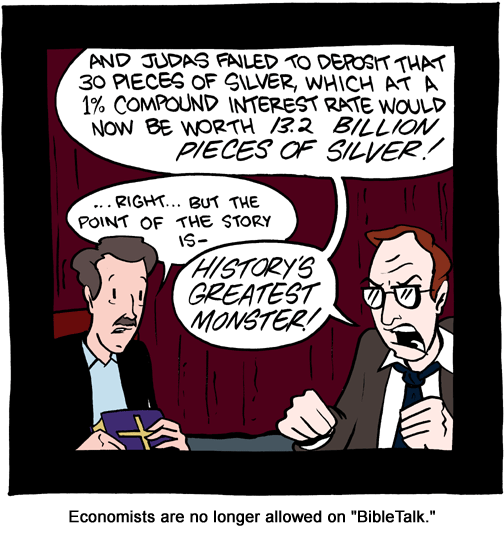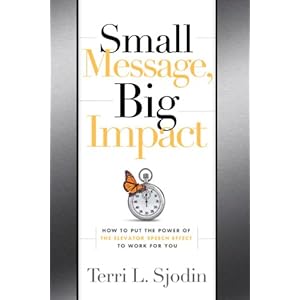My post 4 Ways to Flog the Inner Impulse Shopper is up in Free Money Finance’s March Money Madness tournament. Please take a moment to vote for me(Flog).
Thank you. That is all.
The no-pants guide to spending, saving, and thriving in the real world.
My post 4 Ways to Flog the Inner Impulse Shopper is up in Free Money Finance’s March Money Madness tournament. Please take a moment to vote for me(Flog).
Thank you. That is all.
Last night, my wife and I went to see Evil Dead: The Musical. I’m a die-hard zombie-movie fan, and the Evil Dead Trilogy is among my favorites. I don’t recognize a difference between Candarian demons and zombies, so it still fits the genre.
The musical beats either of the first two movies, hands down. I was rolling. If you are in the Minneapolis area tomorrow, check it out at the Illusion Theater. If you are elsewhere, watch for it. It’s entirely worth the time and money.
Best Posts:
Sometimes, shopping can save you money, but don’t let it get out of hand.
I’ve never had food poisoning, but my wife has. It was unpleasant.
Bacon soda. Yum. No further comment.
Bad marketers. No donut.
Carnivals I’ve been in:
AAA – Save Some Cash was included in the Festival of Frugality.
The Spending Styles of the Rocky Horror Picture Show was included in the Carnival of Personal Finance.
Crack was included in Foodtastic Favorites.
If I missed anyone, please let me know. Thanks for including me!

Monday night, my son was struggling to get all of his homework done before bed. He had a 6 page packet of work from his advanced math class that he was supposed to have done over the weekend.
When I asked him why he hadn’t done it, he told me he forgot about it.
I wasn’t happy.
We’ve had a lot of conversations about responsibility and planning over the years. He knows better.
Cue Dad Lecture #26.
Towards the end, when I’m building up this rocking crescendo about how what he does now will affect him for the rest of his life, I stopped.
“Buddy, weren’t you sick on Friday?”
He didn’t get his weekend homework until Monday. Of course he didn’t do it over the weekend.
Dad Lecture #26 immediately transitioned to Ad Hoc Lecture #4, titled “Why did you let me chew you out for something you didn’t do?”
I’ve always tried to raise my kids to be independent. I’ve never stifled asking questions, and I am willing to explain my decisions to them, even if they don’t stand a chance of winning the appeal. As frustrating as independent, strong-willed children can be, I know it will serve them well as adults.
Now I’m trying to figure out why that fell apart on Monday. I wasn’t yelling at him and he doesn’t think I was. Sometimes, the perception of who’s yelling differs depending on which side of my loud voice you are on.
He doesn’t know why he sat back at took the lecture instead of explaining what happened. He apparently forgot that he was given that homework just a few hours before.
My question to all of you is how can I make my kid behave and obey when necessary, but still have enough backbone to stand up for himself when he’s not wrong? And know when each is necessary.
Doctor appointments, speeding tickets and too much work. That’s what this week has been made of.

Finance links:
Why do the non-politician folks who want taxes raised think a fund for voluntarily paying extra is stupid? If they were sincere, they’d be contributing to that from the start. As it is, it’s just a demonstration of either hypocrisy or a looting spirit.
Paying off your Visa by charging it on…your other Visa doesn’t accomplish anything for you or for Visa. Even if you are GM and Visa is the federal government.
My wife and I are thinking of starting a potluck/boardgame night. Boardgames are a cheap way to spend a fun evening.
Misc links:
The iFixit Blog. Dedicated to teaching you how to fix your own gadgets.
I am not only a geek, I am a Halloween geek. The Stationery of Horror is full of want.
The Pareto Principle works. Even at work. I get 80% of my value from the time I spend writing blog posts. Err. Nevermind.
“Friends help you move. Good friends help you move bodies.”
-unknown
Some people have dozens of friends. I’m not that guy.
I have 6.
Everybody in the world can be divided into 4 categories.
Family tends to fall into the same analogous categories.
It sounds cold, but I hesitate to let people graduate into the final category. My wife used to try to “set me up” with people that she thought I’d like to be friends with, thinking I was sad to have so few friends. It took years for her to realize that I was happy. It’s a matter of quality over quantity. Most of the friends I have, I’ve had for 10 years or more. I’ve known each of them for at least 5 years, not that time is a requirement.
Moving people into the “friends” category is a lot like dating. You get along, so you invite the potential friends out for a drink, one on one. You feel them out to see if they are compatible. You meet their families, share some food, build some history. If it all works out, eventually, you consider them a true friend, even if you couldn’t mark the date of the transition.
You wouldn’t marry everyone you date, so why would turn everyone you basically get along with into a friend?
Do you have a lot of friends? What marks friendship for you?
I was recently given an advanced reader copy of Small Message, Big Impact by Terri L. Sjodin. It’s a book on crafting an effective and persuasive elevator speech.

An elevator speech is, according the the author, “a brief presentation introducing a product, service, philosophy or an idea. The name suggests the notion that the message should be delivered in the time span of an elevator ride, up to about 3 minutes. Its general purpose is to intrigue and inspire a listener to want to hear more of the presenter’s complete proposition in the near future.” It’s a 3-minute speech you give to intrigue someone enough that they will let you give a real presentation.
A lot of people–probably most–use their 3 minutes of unexpected access as an “information dump”. They pour as much data as possible into their audience. According to Sjodin(and I agree!), and elevator speech needs to be primarily persuasive, not informative. You need to include enough information to back up your persuasive arguments, but too much information is at least as bad, if not worse, than too little.
An elevator speech is either a sales pitch or a waste of time. You are selling the right to give more detailed information at a later time. The elevator pitch is not about making the sale. It’s about advancing the ball toward the eventual sale.
Who needs an elevator pitch? You do. Everybody sells. Even if you don’t have a product, a service, or a business, you have yourself. Can you pitch your boss on why you deserve a raise or a promotion?
The author walks you through creating an elevator speech that takes advantage of Monroe’s Motivated Sequence to advance your goal, whatever that is. She’ll teach you how to grab your audience’s attention and make them recognize a need for change. You’ll offer a solution, help them see the super-ninja-awesome future you’re offering, and give them a clear call to action. All in 3 to 5 minutes. Small Message, Big Impact will also teach you to provide a clear progression through those steps, making it easy for your target to say yes.
You’ll learn the basic outline of an elevator speech, including how to grab your target’s interest, build a persuasive case, and establish credibility when you’ve been surprised with a few moments of access. The three pieces of any successful presentation, from an elevator speech to a full-day presentation are
One of the best ways to sound credible, which will assist your delivery like nothing else, is to use an authentic voice. Be sincere and sound it. Believe in the material and yourself. Know the material–inside and out–and practice it until you can deliver it smoothly, even if that means enlisting a friend for speech practice.
Of the books I’ve reviewed, I think this is my favorite. If you need to design an elevator speech or improve the one you’ve been using, you should read this book. Even if you don’t care about an elevator speech, the book provides a decent education on persuasive selling that easily carries over to the written word.
How would you(or do you) use an elevator speech?